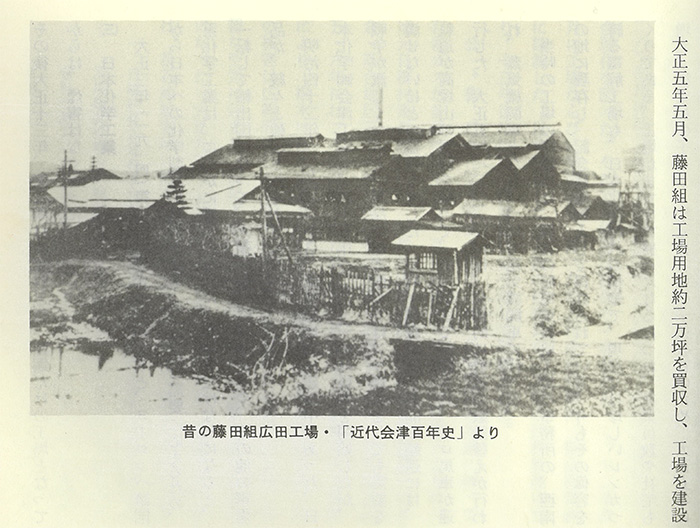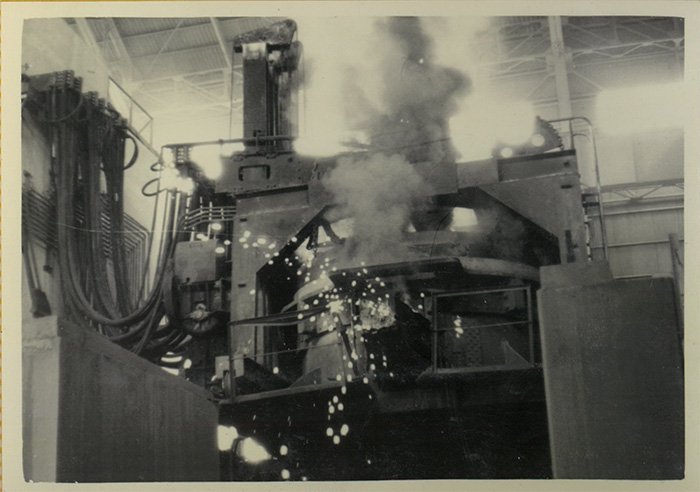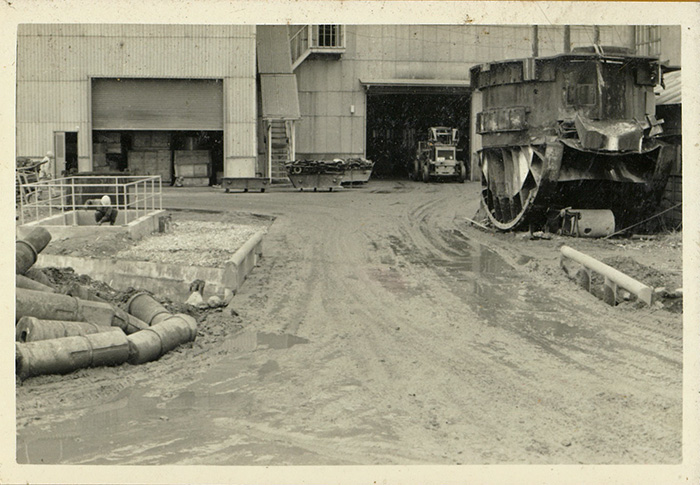2025.05.22

In Aizuwakamatsu, Fukushima, Mitsubishi Steel Mfg.’s 100-year-old Hirota Works continues to adapt to changing times

In May 2024, the Hirota Works celebrated the 100th anniversary of the start of its business manufacturing electric furnace steel ingots back in 1924. The business was established following the acquisition by Mitsubishi Steel Mfg.’s predecessor, Tokyo Steel Co., Ltd., of Hirota Steel Works, based in Aizuwakamatsu City in Fukushima Prefecture, from Fujita Mining Co., Ltd. (currently DOWA Holdings Co., Ltd.). Tokyo Steel was the company produced by the merger between Tokyo Spring Works (established in 1904), Japan’s first spring manufacturer, and Tokyo Steel Works (established in 1916).
Japan 100 years ago

Hirota Factory back when it was run by Fujita Mining (source: 100 Year History of Aizu in the Modern Age)
What was happening in Japan around 100 years ago, when the Hirota Works (known then as Hirota Steel Works) started operation under Mitsubishi Steel Mfg.? A search for information about historical events at that time produces a list of major events by year. Typical examples from the list for 1924 include “Completion of Hanshin Electric Railway’s Koshien Sports Ground” (currently Hanshin Koshien Stadium) “Completion of Meiji Jingu Gaien Stadium,” and “Auto race event held at Tachikawa Airfield.”
The previous year, 1923, was marked by the Great Kanto Earthquake of September 1. Within the same year, Dojunkai was set up as a post-disaster reconstruction project to start supplying apartment housing in reinforced concrete buildings, which provides context as to why the Works began to manufacture electric furnace steel ingots.
In 1925, the Universal Manhood Suffrage Law was promulgated to extend suffrage to all male citizens aged 25 and over. This symbolic modernizing development was driven by the rising democratic movement and other trends of the period, which was referred to as the “Taisho Democracy” and characterized by a relatively liberal atmosphere.
Achieving rapid expansion during the high economic growth period (under Mitsubishi Steel Mfg.)
Hirota Steel Works subsequently built a new casting factory. Then, in 1942, Mitsubishi Steel Mfg. merged with Mitsubishi Steel Co., Ltd. Mitsubishi Steel Mfg. had initially been established as the successor to Nagasaki Steel Works after its demerger from Mitsubishi Heavy Industries, Ltd. Immediately following the end of World War II, the Works began to manufacture ingot cases (iron casting), electrolytic iron, and alloy iron before going on to develop new equipment and expand the product category. In 1963, for example, it installed new equipment to produce steel castings and five years later built new mechanical molding lines (UG5).
In those days, Japan was experiencing a period of rapid economic growth, achieving an annual average growth rate of around 10%. Promoting industrialization and technological innovation to implement an array of large construction projects related to Shinkansen railroad and expressway networks, the Tokyo Olympic Games, and Expo ’70, the country was becoming a leading economic power. Large machinery was introduced to construction sites while newly must-have electrical home appliances such as washing machines, television sets, and refrigerators began to appear in many households.

Hirota Works in the days described

Factory site at Hirota Works in earlier times
Promoting business restructuring through transfer, consolidation, and new establishment (under Ryoko Casting)
As the 1980s rolled along, Hirota Steel Works, under Mitsubishi Steel Mfg., continued to grow robustly, renewing its mechanical molding lines and attached structures as well as entering new categories of products. It came to a significant turning point in 1986, when it was demerged from Mitsubishi Steel Mfg. and renamed Ryoko Casting Co., Ltd. The new company was jointly funded by the Works’ employees and former parent company.
This move aimed to boost the performance of the Works’ iron and steel casting as well as related businesses by downscaling operations to promote streamlining and agile and efficient management, targeting a whole range of processes from manufacturing and processing to sales. In 1986, Ryoko Casting bought and refurbished the Shaw process precision casting production facilities from Mitsubishi Steel Mfg.’s Utsunomiya Works to take over the related business. In 1999, the company took over the special alloy power business from the Utsunomiya Works and completed the consolidation of the Works’ facilities in 2002. In this process, 15-ton electric furnace and ladle furnace facilities were consolidated, steel ingot manufacturing was commenced, and the shell molding machine was transferred.
Continuing to catch the wave of the day
In 2005, Ryoko Casting’s operations were transferred to Mitsubishi Steel Mfg. and the company was dissolved. With this, the facilities made a fresh start as the Hirota Works.
Two years later, the Works took over the Mitsubishi ESCO product finishing process from the Utsunomiya Works at its steel casting factory and built new T6 batch-type heat treatment facilities. Electro-slag remelting facilities and ICP analysis equipment were also transferred to promote the consolidation of the Utsunomiya Works’ processes. Following this, the Works implemented a series of facilities improvements, such as upgrading XRF spectrometers and X-ray diffractometers from 2016, building new office and employee facilities in 2018, and installing a new metal powder water atomizer testing line in 2020. Having completed these plans, the Works has now begun to pursue decarbonization efforts, particularly by promoting a shift to 100% hydropower for purchased electricity.
Established as a major arm of Mitsubishi Steel Mfg.
At present, Mitsubishi Steel Mfg.’s Hirota Works is located in the northern part of Aizuwakamatsu City in Fukushima Prefecture. A total of more than 100 employees work at the 105,000 m2 site, which sits adjacent to Hirota Station on the JR Banetsusai Line. The Works is engaged in the manufacturing, processing, and sale of steel castings, special alloy powders, steel ingots, and other products used mainly in making parts of vessels, industrial machinery, and construction equipment.
The Hirota Works thus plays an important role as a major arm of Mitsubishi Steel Mfg., together with other bases in Muroran City (Hokkaido), Ichihara City (Chiba), and Nagasaki City (Nagasaki).
Overview of Hirota Works
Corporate name: Hirota Works, Mitsubishi Steel Mfg. Co., Ltd.
Address: 405 Aza Rokucho, Hirota, Kawahigashi-machi, Aizuwakamatsu-City, Fukushima
Product line: Special alloy powders, special steel ingots and processed products, steel castings
Business started: May 1, 1924
Established: April 1, 2005
Number of employees: 113 (as of April 1, 2024)
